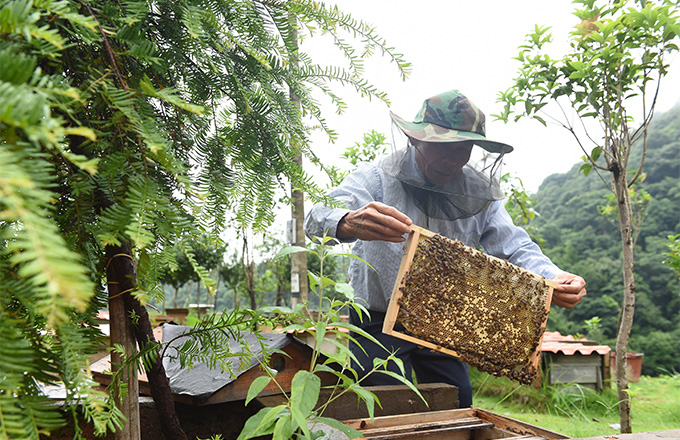Cooperation improves rural lives
In 2001, when Jiewen village in Wuping county, Fujian province, reformed the ownership of local forestry assets, Xie Xiangrong's family of six was allocated more than 30 hectares of woodland.
Before his death in 2013, Xie's father had been ill with various ailments for almost 20 years and his mother has senile dementia, so neither could work. That left the family heavily in debt, and it was 14 years before the assets they had been allocated began to generate an income.
In 2009, Xie began to build a new house to replace his dilapidated home, but a lack of funds meant it took three years to build the two-story house, which was decorated last year. The family only began to benefit from their forestry assets in 2015, after they were given a logging permit that allowed them to fell some of their trees, bringing in 80,000 yuan ($11,750).
As forestry-related businesses develop in the province, more poverty-stricken families are seeing their living standards rise.

In 2015, having secured an interest-free loan of 30,000 yuan with the help of the local government, Xie, 42, set up 60 beehives.
Last year, he planted almost 3 hectares of sarcandra glabra, an aromatic herb used in traditional Chinese medicine, with the aid of a cooperative the government helped to establish in the village that provided about 60 percent of the 22,500 yuan Xie required to plant each hectare.
"We knew nothing about the plant, so the cooperative organized training. We don't even have to worry about selling our produce because the cooperative is responsible for that," he said.
Zhong Taifu, Party chief of Jiewen and also director of the cooperative, said 102 of the 164 families in the village have joined the cooperative, which encourages residents to plant TCM herbs and develop economies of scale.
Last year, the revenue generated by forestry-related businesses, including beekeeping, plant nurseries and TCM herbs, was 25 million yuan, according to the village committee. The per capita net income has risen from 1,600 yuan in 2001 to 13,510 yuan, 45 percent of which comes from forestry-related activities.
Before, when Xie worked in construction and tended 0.5 hectares of farmland, he could barely make 5,000 yuan a year: "Now I can make 40,000 to 50,000 yuan a year from beekeeping, in addition to my other work. Without the government subsidy, it would be almost impossible for me to make so much money."
He plans to cultivate more TCM herbs and has also planted a number of orange trees.
Zhong said the villagers will receive a subsidy for planting orange trees, but the details of the program have yet to be unveiled.
Xie's family is just one of thousands in Wuping who are raising their living standards via these activities. The development of the forestry-related economy and other industries have seen 9,352, or 57 percent, of the county's 21,873 impoverished residents lifted out of poverty in the past three years, according to the county government.
Xu Ruhui, director of the forestry ownership reform office at the Fujian Forestry Administration, said that since 2015, the provincial government has allocated 70 million yuan annually to subsidize the development of the forestry-related economy, with funds allocated to counties according to the area under protection, and poverty-stricken counties are given priority.


















